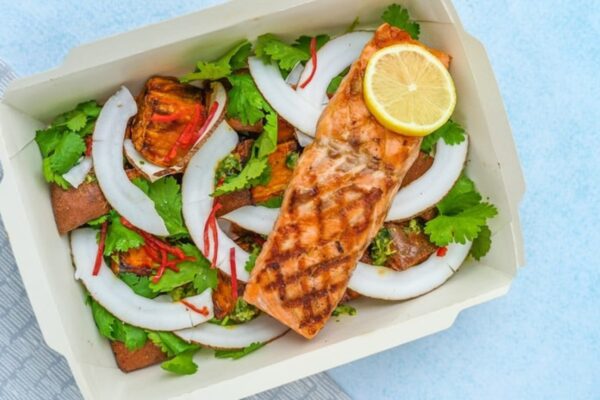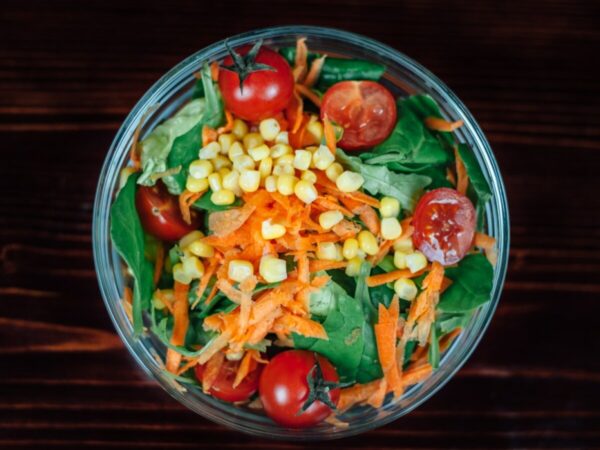There are over 600 muscles in the human body — and keeping them strong is good for your health. In addition to increased joint health and stronger bones, gaining muscle mass can change the shape of your body.
So it’s no wonder regular people and celebrities prioritize strength training and building muscle. Working out, however, isn’t the only factor in muscle growth: your diet also plays a huge role.
Remember, before trying a new diet or workout regiment consult with your doctor — then safely proceed to make those muscle gains.
You have to eat enough total calories:
For your body to have enough energy to grow your muscles, you need to eat more calories than you burn per day. This has to do with how our body breaks down energy.
When you consume fewer calories than you burn, the body breaks down muscle as a source of energy. If the goal is to build muscle, you need to eat adequate protein and enough carbohydrates so that the body doesn’t turn to protein as an energy source.

In fact, eating too few calories is one of the biggest mistakes. The extra calories you consume are necessary for the results you want. How can we expect to perform at levels necessary to build muscle if we aren’t prepared? If you want to go on a road trip you can’t put five bucks in the tank.
The amount of calories that your body needs depends on your weight, metabolism, and the intensity of your workouts. You can determine your total daily calorie expenditure (TDEE) with an online calculator. This is the number of calories your body burns per day. You need to eat more than that number to gain muscle but consult with your doctor before making any changes.
Related article: The Time Of The Day When You Burn The Most And Least Calories For Optimal Weight loss
You should emphasize protein:
Dietitians aren’t joking when they say that protein is an important part of a healthy diet, but this is especially true if you want to build muscle. This is because protein is made up of amino acids, which help build and repair muscle tissue.
You can get your amino acid fill by eating foods like chicken, seafood, beans, eggs, and dairy. Minimally processed sources like hemp seeds rather than processed protein sources with added sugars. I also encourage prioritizing plant-based protein sources since they also offer fiber which the average American does not eat in sufficient quantities.

Some studies have shown that how often you consume protein can impact your muscles and your muscle-building capacity. The verdict is still out, however, on the size of this impact. It is beneficial for your muscles to spread your protein throughout the day, but the research is not totally conclusive.
Even if the muscle benefits aren’t proven, divvying up your protein throughout the day has been shown to help curb hunger cravings.
Related article: 10 Foods That Contains Highest Amount Of Protein To Add To Your Muscle Gaining Diet
It’s possible, however, to overeat protein:
Eating 20 to 25 grams of protein per meal for an average high protein meal. She did note that a common misconception is that eating extra protein builds more muscle.

If your calorie needs are being met, eating more than 2 grams of protein per kilogram body weight per day has not been shown to offer additional muscle-building benefits and can actually be harmful.
Overeating protein has also been associated with kidney issues, so stick to the recommendation of no more than 2 grams of protein per kilogram of your body weight and consult with your doctor.
Related article: 16 Types Protein That Are Tasty And Lean protein And Help You Lose Weight
Water is your friend:
Despite the fact that muscles are made up of 79% water, many people underestimate its importance when it comes to building muscle.

Going to the gym while dehydrated means instead of putting energy toward building muscle, you’ll be fighting fatigue, nausea, and headaches with every step. However, when you’re drinking enough water, your body achieves the right level of fluids and electrolytes and therefore can function optimally.
In fact, you should drink 16 to 20 fluid oz of water prior to exercising and16 to 24 oz after. Aside from the benefits at the gym, getting the correct amount of H2O can actually help you avoid overeating and covering your newly gained muscle with fat.
Related article: Why Water Is Guaranteed To Improve Your Athletic Abilities
Eat both carbohydrates and protein before you workout:

According to The Academy of Nutrition and Dietetics, you should have both carbs and protein pre-workout to build muscle, and you should ideally eat one to three hours before exercising. Carbs fuel your body while protein builds and repairs it.
But having both before helps “prime the pump,” according to the academy, and makes the right amino acids (or building blocks of muscle) readily available to your muscles.
Related article: Manage Your Carbs To Make Significant Muscular Gains
Post-workout protein and carbs are crucial, too:
Nutrition is just as important post-workout as it is pre-workout. The “anabolic window” is the name for the ideal post-workout eating time range. Medical professionals used to think that the time frame or window was much shorter, but, the latest research shows that the window is actually open for several hours.

To get maximum muscle growth and recovery, one study found you should aim for protein and carb consumption four to six hours post-workout. However, that nutrient timing isn’t as essential as your overall consumption of healthy minimally processed protein for the day.
Related article: 6 Of The Best And Most Beneficial Foods And Drinks To Eat Post Workout
Don’t slack on micronutrients either:
Your body needs micronutrients in addition to protein, carbs, and extra calories to stay healthy. Micronutrients even play a part in the muscle-building process. Muscle cells need iron, a mineral micronutrient, to produce energy. Iron is a component of hemoglobin which is a part of your red blood cells that carry oxygen to the cells in your body.

Endurance athletes, particularly those who are female [or] vegetarian or vegan, are at special risk for iron depletion and should have iron levels checked periodically by their doctor. If you are eating a balanced diet, you won’t need to take extra vitamins, minerals, or supplements.
Related article: 7 Great Ways To Incorporate Veggies Into Your Diet To Maintain Health And Weight
Make sure that you are working out and putting those calories to good use:
You might be eating to build muscles, but you won’t actually develop any if you don’t exercise. Muscle growth requires that muscle fibers be stressed [or] damaged. It is the repair process that results in muscle growth. Simply consuming high amounts of protein without also stressing the muscles will not result in muscle growth.

Reaching aesthetic goals comes down to two controllable factors: input and output. The amount of food you take in will determine whether or not you gain or lose weight. The type of training you do will determine whether or not you develop lean muscle or not.
Performing anaerobic exercises such as moderately heavy weight training as well as a combination of sprints and interval training for maximum muscle-building results.

